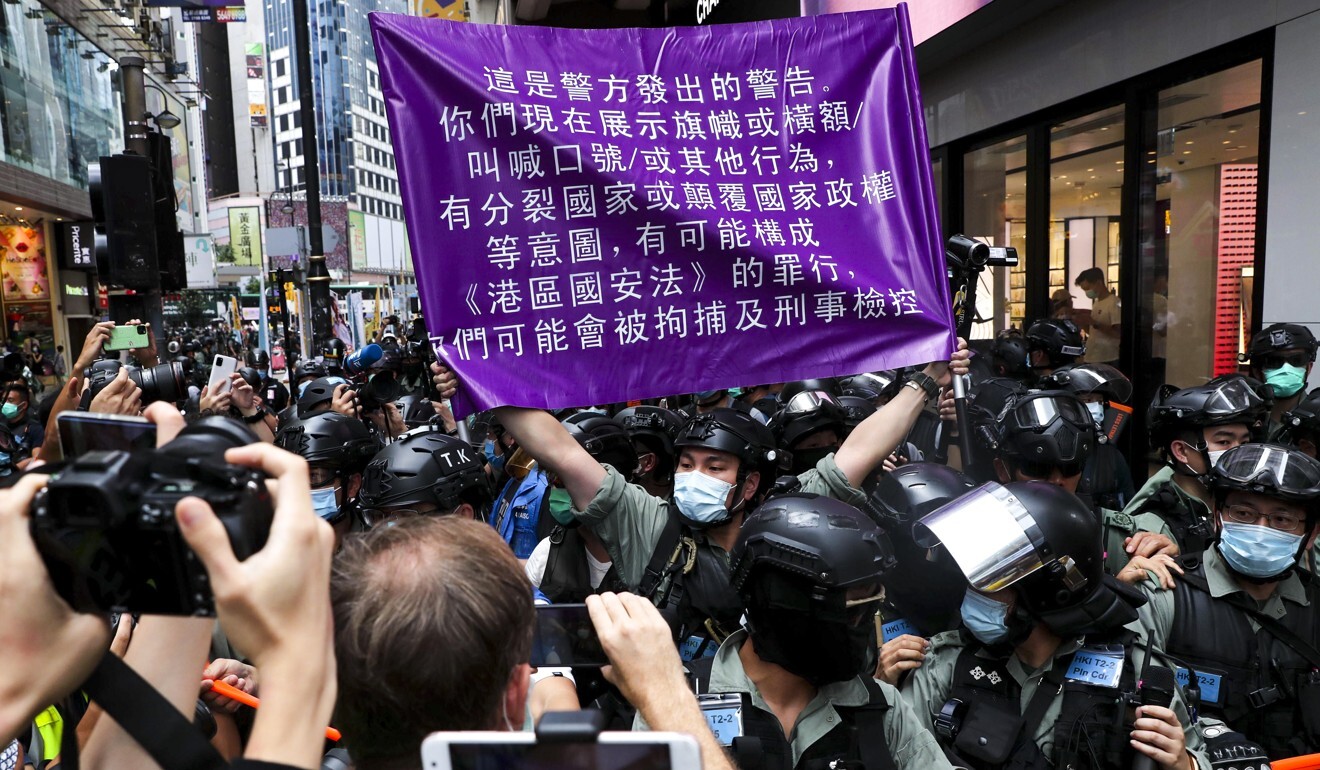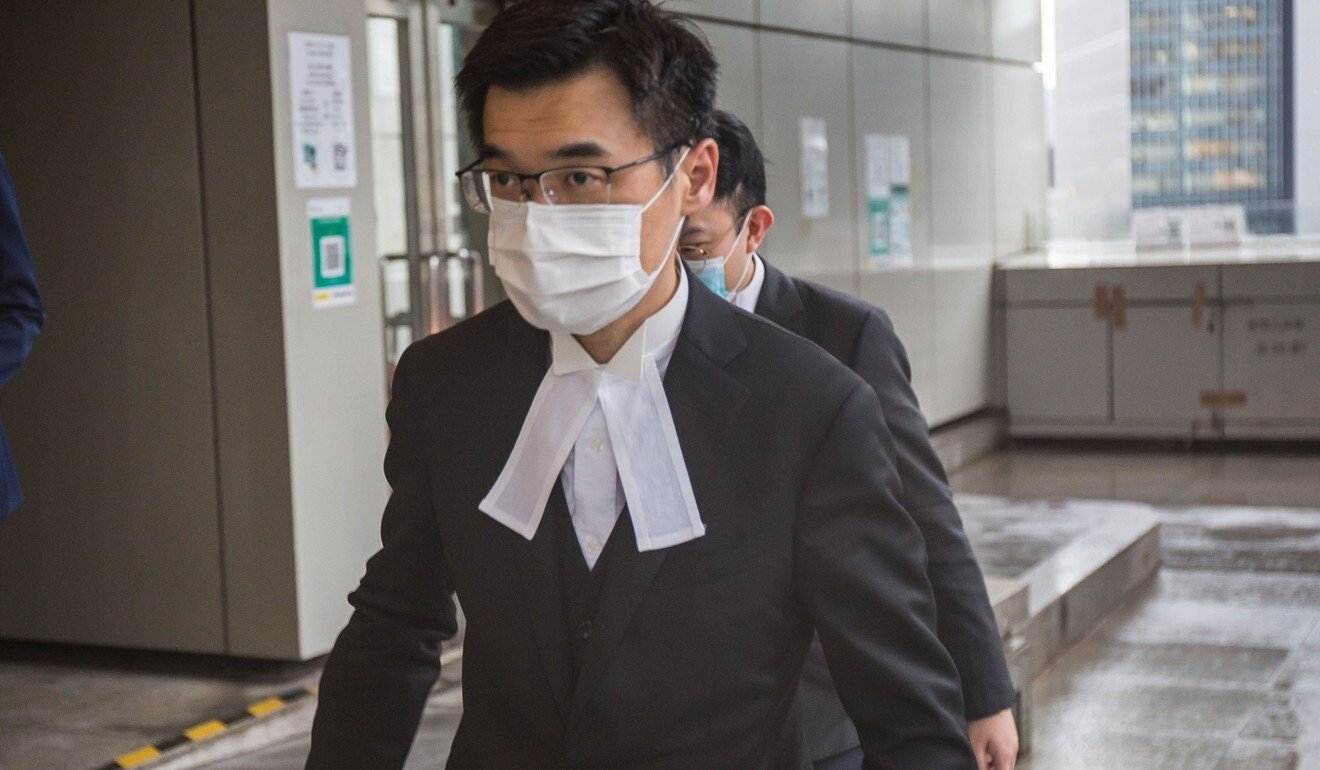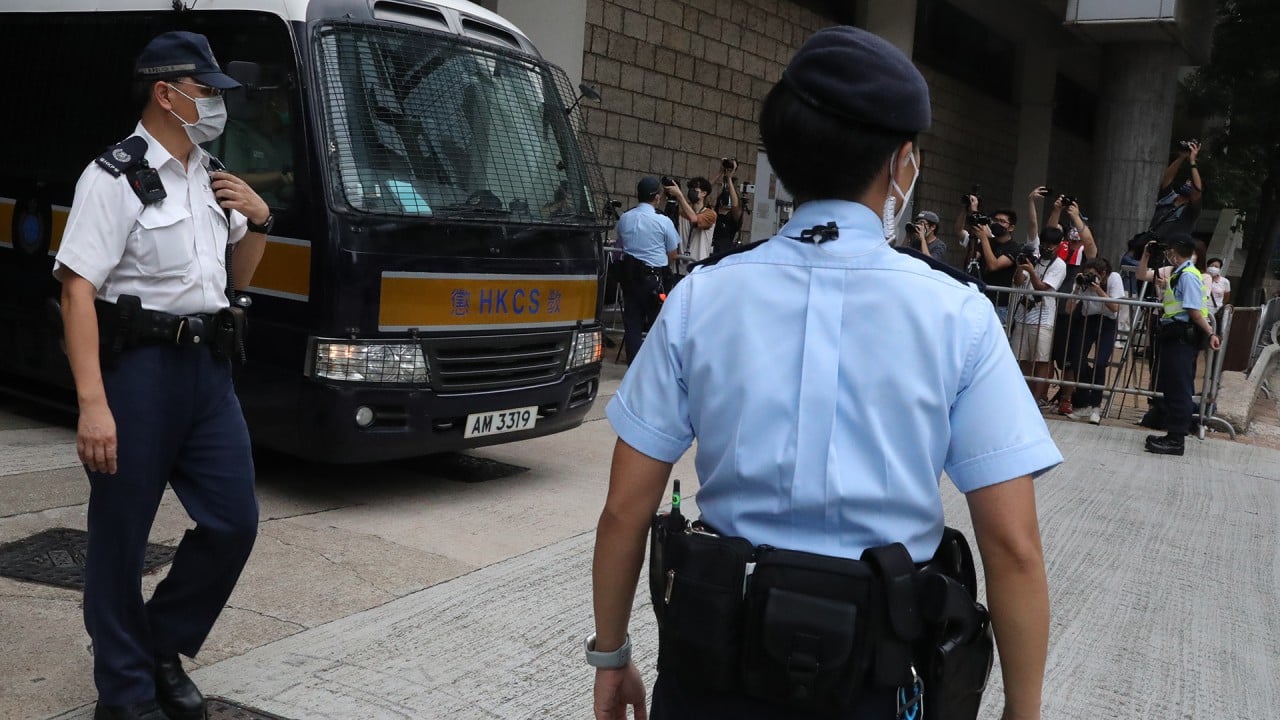
National security law: protest slogan ‘Liberate Hong Kong’ can have multiple meanings, but is it ultimately a call for secession?
- Defence lawyers argue slogan ‘Liberate Hong Kong; revolution of our times’ can be ambiguous, while prosecutors insist there is only one literal meaning
- Judges say it is sufficient for the prosecution to prove that inciting others to take separatist action is a possible effect
On Tuesday, restaurant worker Leon Tong Ying-kit, 24, was found guilty of inciting others to commit secession and engaging in a terrorist act after crashing his motorcycle into three police officers while carrying a black flag at a July 1 protest in Wan Chai last year.
The court’s judgment turned on the slogan, its meaning and usage, with seven days of the proceedings examining these.
At the heart of the issue for both sides was this: was there only one interpretation to the rallying call being one that promoted secessionist activities, or could it have an alternative meaning?
Prosecutors had insisted the answer to the question was a simple “no”, citing a historian’s opinion and police reports on the demonstrations. They had argued the catchphrase could only carry a literal meaning: to recover or free Hong Kong from the control of the “enemy” and cause a change in the “times” by overthrowing the government.
The defence had countered otherwise, quoting two social scientists who contended the slogan was ambiguous and open to interpretation, including whether it actually advocated Hong Kong’s separation from China.

At Tuesday’s verdict, the judges brushed aside the debate on whether there were multiple meanings to the slogan, or just one.
It was sufficient, the bench held, for the prosecution to prove that inciting others to take action to separate Hong Kong from China was one possible effect of the phrase. The court noted that even the defence had not challenged the prosecution’s point that the slogan could carry a secessionist meaning.
The court ruled the defendant must have intended to convey a separatist meaning to the general public with his display of the slogan, given the conspicuous manner he had driven his motorcycle, his state of mind at the time of the offence, and his repeated challenge to police, a symbol of law and order.

The eight-character Cantonese chant has become taboo since the national security law took effect on June 30 last year, with police officers told to immediately arrest anyone advocating the city’s independence or liberation.
The Hong Kong government also issued a statement explicitly calling the slogan a pro-independence expression.
All parties in Tong’s trial agreed the slogan was first coined by jailed activist Edward Leung Tin-kei during his bid for a Legislative Council seat in a by-election in February 2016, where he had advocated for Hong Kong’s independence and appealed to his supporters to challenge the government through violent means.
Leung, who had used the chant as his campaign slogan, said he had thought about using the word “generation” to replace “times” in the sentence, but eventually opted for the latter.
Is chanting ‘Liberate Hong Kong; revolution of our times’ now illegal?
“It’s either revolution of our generation or revolution of our times, but this is not a tug of war between generations, but between eras,” Leung said then. “It represents the people who believe in freedom, embrace freedom, and are willing to fight for freedom with their blood and sweat.”
Historian Lau Chi-pang, who testified for the prosecution, argued the slogan’s meaning had never undergone significant change after it became dormant following Leung’s failed bid to enter Legco, and that one could still associate it with independence when it was first picked up by protesters during a demonstration outside Beijing’s liaison office on July 21, 2019.
Lau, a council member of the semi-official Chinese Association of Hong Kong and Macau Studies think tank, said the two key terms in the slogan – “liberate” and “revolution” – had carried the same meaning since they were used in Chinese historical texts such as Records of the Three Kingdoms and the Book of Jin.
‘Liberate Hong Kong’ chant may not break security law, lawyers say
“The words have been used since the period of the Three Kingdoms in China to modern times, and the meaning involved has not changed throughout a thousand years,” the Lingnan University professor said in a written report to the court.
Lau stressed that the two parts of the phrase must not be read in isolation. Liberate could not have meant the same as liberating oxygen from water or liberating someone from work duty, he said, while revolution could not be understood as mere advancement, such as a technological revolution.
The professor also cited a police report, which said the chant could be heard in a total of 825 open source videos of protests between 2019 and last year. Lau said this showed the slogan was closely connected to secessionist and subversive attempts, as it was always used alongside other chants advocating Hong Kong’s independence and the toppling of the Communist Party.
However, Lau acknowledged Leung’s understanding of the slogan in 2016 might not represent how the defendant perceived it when he affixed the flag carrying the words on his motorcycle on the day concerned.

That concession was used as a point of attack by the defence experts, political scientist Eliza Lee Wing-yee and journalism scholar Francis Lee Lap-fung. Both sought to weaken the prosecution’s case by highlighting the ambiguity of the wording and the variety of opinions as to what the rallying call meant to supporters of the movement.
Eliza Lee, a politics professor at the University of Hong Kong, contended the slogan could at best be translated as meaning “to restore an old order that was lost” and “to unite freedom-loving people of all ages to bring historical change in this significant period”.
She said protesters had used “liberate” as an alternative to “reclaim”, referring to various potential actions targeting the perceived nuisance caused by the influx of tourists and parallel traders from mainland China. Those demonstrations, however, were not aimed at toppling the government, she said.
‘Liberate Hong Kong; revolution of our times’: Who came up with this?
Francis Lee, director of Chinese University’s school of journalism and communications, referred to data mined from the popular online forum LIHKG, which found no strong correlation between calls for liberation and independence in 25 million posts and comments between 2019 and last year.
He also cited a 19-page study he conducted last year in suggesting the slogan’s popularity among even moderate protesters could have been related to a strong desire to appeal to the international community rather than an outright or clear demand for independence.
“The presence of sentiments favouring more fundamental social and political changes cannot be dismissed, and the government’s continued refusal to respond to movement demands generated frustrations and anger that need to be expressed,” the report said.
Eight Chinese characters that have the Hong Kong government worried
“The ambiguity of ‘Liberate Hong Kong; revolution of our times’ thus serves the purpose of ideological restraint and allows the expression of radical sentiments at the same time,” it concluded.
The journalism professor also questioned the relevance of the police report, saying the juxtaposition of the allegedly offending slogan with other separatist chants did not necessarily mean those who called for the city’s liberation supported independence.
But even if alternative interpretations were possible, the prosecution argued the defendant must have understood the slogan as being separatist, given how he displayed the flag in a high-profile fashion and attracted cheers and applause from pedestrians while riding his motorcycle.
Prosecutor Anthony Chau Tin-hang said in his closing remarks: “The defendant’s conduct has to be considered as a whole, including his driving manner, how he rode into police check lines.”

But defence counsel Clive Grossman SC urged the court to focus on how the slogan’s recipients would have understood the wording, instead of relying on “rigid” views based on history.
“The slogan can be used not only for articulating demands, but also expressing sentiments promoting solidarity … in the [anti-extradition bill movement], where slogans can be ambiguous,” the lawyer added.
The prosecution’s approach to the question turned out to be the winning argument for the court.
In their 62-page verdict, the three judges said their concern was simply whether in the particular circumstances of the case, it was the “natural and reasonable effect of displaying the flag with the slogan on it” that incited others to act to separate Hong Kong from China.
It was not necessary to step into the legal quagmire of analysing the etymology of the words, or the transformation of the phrase by protesters of the 2019 movement, according to the panel.
Unpacking the Hong Kong protests factor in Taiwan’s election
“We should reiterate that what we are concerned with in this case is not whether the slogan meant one and only one thing ... but whether the slogan, when taken as a whole after considering all the relevant circumstances, was capable of inciting others to commit secession,” the judgment read.
The three judges highlighted the “context” in which the defendant had displayed the slogan – how he had carried a flag on the anniversary date of Hong Kong’s handover to China and the day after the promulgation of the security law; as well as how he had driven past major thoroughfares on Hong Kong Island, parading the streets in Wan Chai and ignored multiple police warnings.
They also pointed to Tong’s telephone conversation records, which they found had showed that the defendant was aware of possible breaches of the security law with his use of the slogan, and that he could not have intended to merely convey innocent meanings.
“We are sure that, as evidenced by the convoluted route he chose, the defendant was out there deliberately displaying the flag,” the judgment said. “We are also sure that the defendant fully understood the slogan to bear the meaning of Hong Kong independence.”

02:10
Man found guilty in Hong Kong’s first national security law trial
Executive Councillor and barrister Ronny Tong Ka-wah said the court’s judgment suggested that circumstantial evidence was more important than the historical meaning of the slogan.
“On criminal offences, the judgment would be based on circumstances and common sense more than historical meaning of some Chinese characters,” he said. “It’s more on how the defendant incites others and how the public perceives his messages.”
Tong said he believed that for similar cases in the future, the court would take the same approach and rely less on academics’ testimonies.
The verdict in Tong’s case is expected to set the threshold on coming national security law trials as well as those involving Hong Kong’s colonial-era sedition law.
Three out of 65 defendants currently awaiting trial on security law offences have been slapped with secession charges, with at least one of them charged over his use of the same offending slogan.
First person tried under Hong Kong national security law guilty of secession, terrorism
The legality of the rallying cry is also tied to the cases of at least two defendants charged with sedition under the colonial-era Crimes Ordinance, including opposition activist Tam Tak-chi.
Judge Stanley Chan Kwong-chi, who will preside over Tam’s sedition trial of opposition activist Tam Tak-chi, had questioned whether he should take the High Court’s judgment on the slogan’s meaning as the final word on the subject.
The verdict, he had previously suggested, could not be said to be binding unless it came from an appellate court.
Another defendant, decoration worker Chan Hau-man, was charged with sedition under the city’s Crimes Ordinance for waving a flag with the “Liberate Hong Kong” slogan in a protest in May last year.
He did not enter a plea on that charge, however, as prosecutors agreed to drop the allegation given he pleaded guilty to a separate charge of unlawful assembly. He was eventually jailed for three months.
Additional reporting by Lilian Cheng
